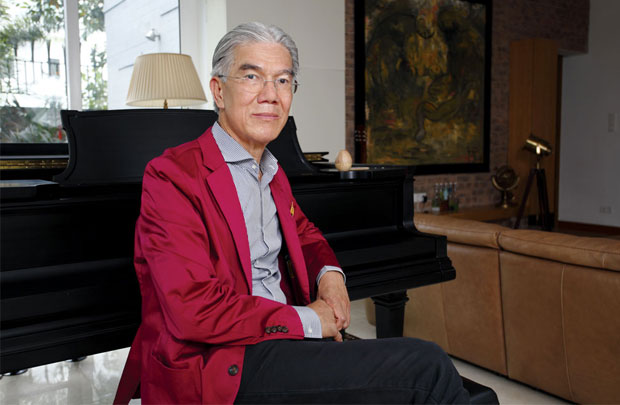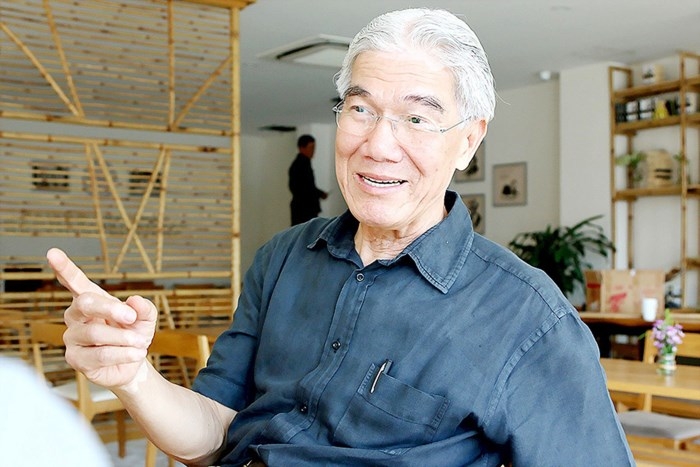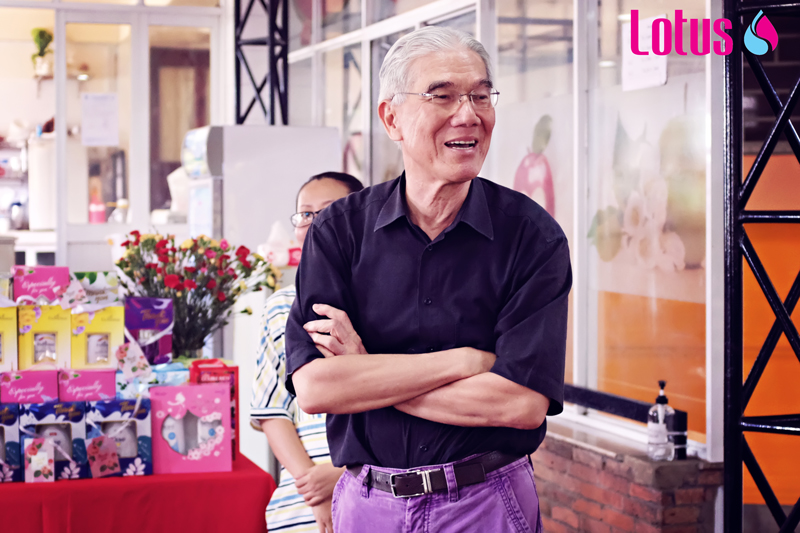After giving up his flavorsome life working in a multinational corporation in Germany, and 25 years of overseas, in 1995, Mr. Nguyễn Như Khuê finally decided to settle down in his own motherland, Vietnam. By the name of Lotus Chemical Technology, his company is destined to perform technology handover, and manufacture PVC packaging.
In 2009, by the will of entering the global trend, Lotus became partner with RKW, one of the largest European corporation in plastic film and plastic fiber, establishing joint venture called RKW Lotus Corporation with the dream of conquering Asian industrial packaging market, consumer goods packaging, hygienic quality packaging, nonwovens and plastic net.
After 9 years of co-operation (2004-2013), RKW Lotus became the largest plastic exporting company in Vietnam with exporting value reached 60 million USD per year, worth 30 percent of total plastic shares of the whole country.

Mister Nguyễn Như Khuê, Chairman and CEO of Lotus Chemical Technology
* The pathway seemed so smoothly, why did the separation happen?
“At first, Lotus’s activity focused on three main field: plastic, watering and environmental technology handover; manufacturing and exporting goods (including plastics packaging and film); and manufacturing abroad replacements’ goods for domestic market. In 2003, RKW Corp. wanted to invest in Asia and really wanted to choose China market to be its main competitive target, but surprisingly, Chinese factories were everywhere, so they decided to choose Vietnamese market instead. Chairman of RKW used to be my classmates when we had studied in Germany, so we decided to work together.
After 9 years, RKW Lotus had expanded 10 times larger, compare with the start at 2004. In 2010, after reaching revenue worth of 60 million USD and dominated Vietnamese market, we wanted to become the leader in Asian. But to have this satisfaction, RKW had to acquire in various criteria, such as revenue, quality, market and production assurance, and some others.
So we decided to push further by promising to work together and build a high-tech project with Lotus EuroTech Center in Vietnam. Without notice, my partner dropped out from the position of RKW CEO. The successor, however, did not share the same vision and wanted to move the entire plant to China.
To keep my own reputation and nation’s pride for the people who had supported me - the ones who had agreed to give us the chance to build the plant at Saigon Hi-tech Park - I decided to distrust RKW’s command and continue building the project all by myself. Devastatingly, since the workload was too heavy, I had to let RKW did what they wanted to do, me could take care of the project at High-tech Park only.”
* Compare with other FDI investors who want to invest in Hi-tech Park projects, 50 million USD of yours seem minimal, but for a personal investment, this is a big chunk of problem, how could you handle the situation?
“To expand the project, we need resources of course. So I bought a Lotus Packaging factory from Boizenburg, Germany to open up an opportunity to bring high technology resources back to Vietnam as soon as possible; and find partnership simultaneously because for a personal investor like me, the amount of money that in needed is tremendously overwhelming.
Sadly, I’m still unable to find any capital that in needed, because Vietnam capital market is not in the domain of my understanding. Secondly, the capital that I currently have is totally based on the connection between me and my foreign partners, so I can tell you that basically, that capital is on my own, including the cost of buying the entire German factory.
Marketing assurance is the next big thing after investment. In a sense, I can handle the market for a period of time. But I can’t carry everything on my shoulders.
Because we have just explored a whole new world in high technology market - such as medical production and hygienic production (diapers, sanitary napkins, for example) - I need a partner holding my hands to ensure production output. Things seem okay right now, but life is not easy. I feel lonely sometimes.”
* High technology investment is very welcomed by the government. As personal view, what is your sense of pros and cons of this market?
“From the perspective of policy, I can see that the partnership is well-supported. But since Hi-tech Park is the cover art of Ho Chi Minh City, the pressure to act in this stage is intensely, means each business has to ensure skills, high-end technology, production blueprint, and others. These requirements may give FDI investors more competitive advantage than us Vietnamese.
Our company is also stuck at factory construction progress, despite the fact that this project has been authorized and real estate is supported since 2012. The reason is because my partner suddenly jumped off the project in the middle of the game, I’ve become a lone wolf in the battlefield since.
Because of being left, I have to rework from scratch, from procedures to marketing, technology and production. Right now, I’m preparing for market seeking. In the late 2013, I had bought a German factory and restructured them, and I’m only at the beginning of personnel organization, preparing to take control Hi-tech Park factory.”
* Do you think that this journey is a little too overwhelming?
“Deciding to invest in high technology packaging states the sense of nation’s pride and the dignity of a Vietnamese company. Some people in the board of Hi-tech Park management feel for us and let us stay here.
Vietnamese people talk a lot about restructuring the economy, but if you want to be a leader in high technology, you firstly have to have a market. That’s the reason why I bought the German factory, because it has the resources and the market all together. Still, the journey has a lot of ups and downs in its way. I choose Germany because it is the toughest market full stop.
Everything’s cheap in Germany, compare with others like England, France, or Australia. Walmart Corp. used to try to play the game and they had to back out after 10 years because German competitors only set the profitable rate of two percent, while Walmart set the number to be five, made it very difficult to sustain. However, if we can survive in this market, we will have the chance to grow up further.”
* Have you ever felt that Vietnam is a wrong place to make an investment?
“I had said farewell to my prominent work in Germany and went back to Vietnam not totally because of my own business interest, but because I have a debt to repay. A debt for my motherland, and a promise to my mentor 30 years ago, when I was just a young boy at Chu Văn An High school (Ho Chi Minh City).
On the day of departure to Germany, before we went to study abroad, we said farewell to our headmaster. And he said to us “It is joyful to see you go, but hopefully you guys don’t forget Vietnam.”
I made a promise at the time: “We will never forget Vietnam, we’ll be back”. I went to Germany with an empty stomach, and after 25 years I could take care of myself and my family. Still, I had a vow with my own country.
When I was the Manager of Tech Service Center for ICI Corporation in Germany, in order to have a platform entering Asian market, I had had agreed to work as a manager for a very big technology corporation in Germany to which office located in Singapore that in charge of Pacific Asia.
I was only 18, 19 years old when I left Vietnam. Because it was the time of turbulence, I was unable to go much and had not have the chance to understand Asian culture. This is the chance for me to understand Vietnam if I want to compete in this market. Since that time, anywhere I went, to the countryside or rural area of Austria, Switzerland, and Sweden, I felt heartbroken thinking of Vietnam.
When I was in charge of Asia market, I had saw that Vietnam market was still immature, competitive advantage was weak, compare with other giants like China, Japan, Malaysia, Thailand and Indonesia. Empathically, I felt dreadful to see that there were many things that we Vietnamese were able to do, but for many reason, the door of opportunity was unforeseen. That had created a strong motivation for my homecoming.

* How do you feel about Vietnam market?
Vietnam has many resources for a more juicy increment, the economy’s growth rate could be up to 15-20 percent, but I can not understand why those statistics are so humble: only five, six or eight percent. Vietnamese people and Vietnamese wisdom have enough power source to lift this country moving upward. I realized this fact based on the success of RKW Lotus, from the very beginning to 2013, not even once we had growth rate below 15 percent.
If they run ahead of you with the pace of two, three or five percent, while you are one who got left behind with growth rate of seven percent and you are acting like a snob you will never be able to outrun them. The same with China, Korea and Singapore, at the very beginning, they all have growth rate of two figures.
* As a perspective of an economist, what could be done to solve this problem?
I do believe that as a leader you have to be ambitious. The passion will spread out thus mold the heat for the next generation. When I was a guest of the Army Parade of Independence Day celebration, I was so prepared to listen to the speech of a young woman who just graduated HCMC Law University. But her speech was so discouraging.
We look at the past too much, while in fact we should look at the future. Where would we be in the next five or ten years - compare with the world - is the vital question. Which means the goal has to be clear, not vague. Keep moving forward as fast as possible is the only choice to be free from the pressure of others.
I don’t care about other people’s speeches, but her speech represents the voice of the next generation. The speech of competitive swimmer Nguyễn Thị Ánh Viên however, was very admirable. Accomplishment is just the past, we want to climb on top of the next goal. Arrogant is not a choice of us.
* Is there any difference between working as a foreign company’s employee and a company managed by your own hand?
I never thought of myself as a servant, since I have never been paid any supplementary salary. On the height of executive branch like this, you have to work, not to finish the day, but to finish the job. One of the things that I hated the most is to read stats from lower branches, then write a summary report sending to higher executives.
Dozens of reports from other places sent to me every month. I had to summarize them and send the report up to higher executives. The corporation thought this work was necessary, but in my view the job was just a waste of time (smirk).
On the other hand, when I work in Vietnam, I feel that my job is to serve the country, and I can take care of a lot of families, since when I was in RKW Lotus, I took responsibility for 500 employees. Tired though, I do feel happy that I could mellow down job relations and bring people closer together.

* What is the most important factor for a leader in your opinion?
For me, those are visionary and determination. Visionary determines the progress of your company, your country, and your people, so you will know the advantage of yours compare to others thus know where you’re heading. Then, you will know your own value and be able to choose a proper position to stay.
At the beginning I told you that the entire plastic and packaging industry in the world has the average growth rate from 3 to 5 percent, but you, you have growth rate of 20 - 30 percent, sometimes 50 percent per year, which means you are stealing market shares from others. In order to compete with them, you have to know your cutting edge advantage thus attracting their customers.
To achieve this, you have to acquire three things simultaneously: marketing expansion, production development, and customer satisfaction. There are some plastic FDI corporations being unable to survive in Vietnam because they just know how to wait for the customers to come, instead of hunting them.
Customer buys from you 10 dollars, but in reality she has the resource to buy 100 dollars more. So your job is to see whether your customers buy the goods from any other competitors, thus create an advantage to make them buy the goods from you. Same thing with production advantage, if you only know how to make a sole product, you will have trouble competing with others.
RKW Lotus used to have a plan that each year we would successfully build a new factory. We had come to conclusion that each market requires some certain products, thus affirming that our production will be able to outplay other competitors. However, price competition is not a durable option, because if you try to nail customer by cheap price, you will be doomed eventually. This is the basic foundation of success.